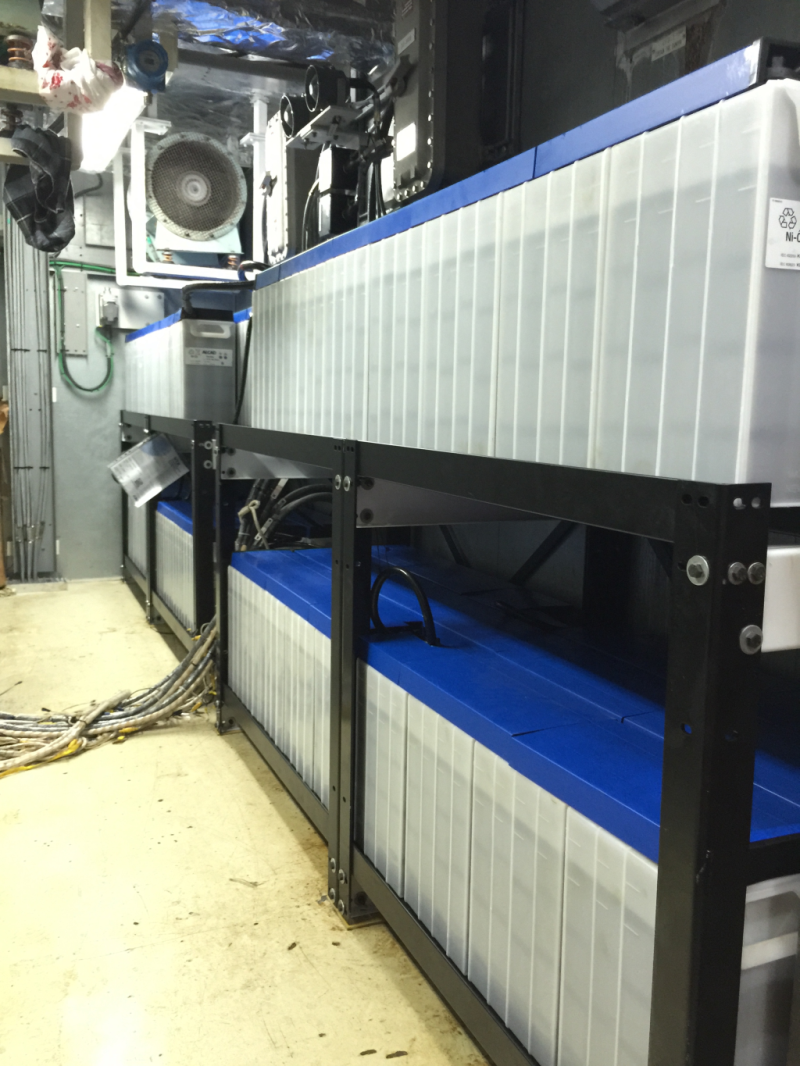Mikael Greis, product manager for leading supplier of batteries for standby power Alcad, explains how nickel technology batteries are ensuring high reliability and performance in backup power systems at the Su Tu Den offshore oil and gas installation in Vietnam
Reliability is key for unmanned oil platforms as it is vital that critical control and safety functions are never compromised. An unplanned power outage on an unmanned oil platform has potential to result in multiple and complex effects. These may include a costly process interruption and having to schedule a visit from a technician to the site by helicopter or supply vessel, which can be costly or take a long lead time.
This is why choosing equipment that will operate with reliability and effectiveness is one of the biggest priorities for operators of offshore oil installations. Selecting equipment with low maintenance requirements is another way to control costs as it reduces the workload on technicians.
One step that offshore platform operators can take to improve reliability levels and reduce maintenance is by adopting nickel technology batteries rather than valve regulated lead acid (VRLA) batteries in their uninterruptible power supply (UPS). Nickel batteries have several key advantages over VRLA, which has been the conventional choice. In addition, many nickel technology batteries are maintenance-free, requiring no topping up of electrolyte.
The lifetime of nickel batteries is also three times the calendar life longer than that of VLRA batteries, even in hot climates. Alcad’s nickel batteries have demonstrated a service life of more than 25 years. Although high temperatures have a significant curtailing effect on the life of VRLA batteries, nickel technology is affected to a lesser extent, reducing the need for cooling systems. For example, battery life in a 35°C battery room will drop by only 20 percent for nickel technology, compared with 50 per cent for lead-acid.
Compared with VRLA, nickel batteries also have a longer calendar life and age reliably with no risk of “sudden death” failure that can occur in VRLA technology when there is a power failure and the battery has to supply the load. This “sudden death” failure can also occur during capacity testing in VRLA batteries. The thorough testing can soften the lead electrode, which also acts as the structure inside the battery. This can result in sudden and complete loss of capacity. In comparison, because nickel batteries have a solid steel structure, they have a long life with a predictable rate of aging.
Nickel batteries also have another key advantage in the form of faster recharging when compared to a VRLA battery. This results in minimal down-time and maximum availability of a UPS. In turn, this allows operators to either minimise the time when the power supply is not protected or to reduce the specification of their standby backup systems.

Another positive of nickel batteries their low TCO (Total Cost of Ownership). Although their initial purchase price is higher, they are less expensive over the life of an installation, taking into account the cost of purchase, maintenance, service, repair and replacement over the life of an installation. Their long calendar life is a major advantage here, and also helps to reduce logistics to transport new batteries offshore.
One operator that recognised the potential of nickel batteries is Cuu Long Joint Operating Company (CLJOC), the operator of a platform in Su Tu Den (Black Lion) oil field, located in offshore block 15-1, approximately 50km off the southern coast of Vietnam. Vietnam is the third-largest oil producer in southeast Asia and is a net exporter of crude oil.
By adopting an offshore oil platform capable of autonomous operation at Su Tu Den Well Head Platform A (WHP-A), CLJOC can extract oil efficiently while minimising safety and operational risks.
CLJOC has traditionally used VRLA batteries as the basis of its UPS systems. However, the operator decided to upgrade to a backup battery system after recognising the advantages of reliability, maintenance-free and long-life that Alcad’s Vantex nickel technology offers.
It was these advantages that led CLJOC to switch to a new backup battery system made up of 100 individual Alcad Vantax VTX1 M 270 cells, each with a rated energy storage capacity of 270Ah. This capacity allows the battery to support 90 minutes of autonomous operation, including providing power for essential control and safety functions on board WHP-A.
Alcad’s Vantex batteries are used widely in oil and gas installations, which are typically in remote locations with restricted access. The batteries are used to provide emergency power and UPS applications as well as support for control, instrumentation and safety systems. The batteries have a sturdy ‘pocket plate’ construction that can withstand manual handling in a tough environment.
